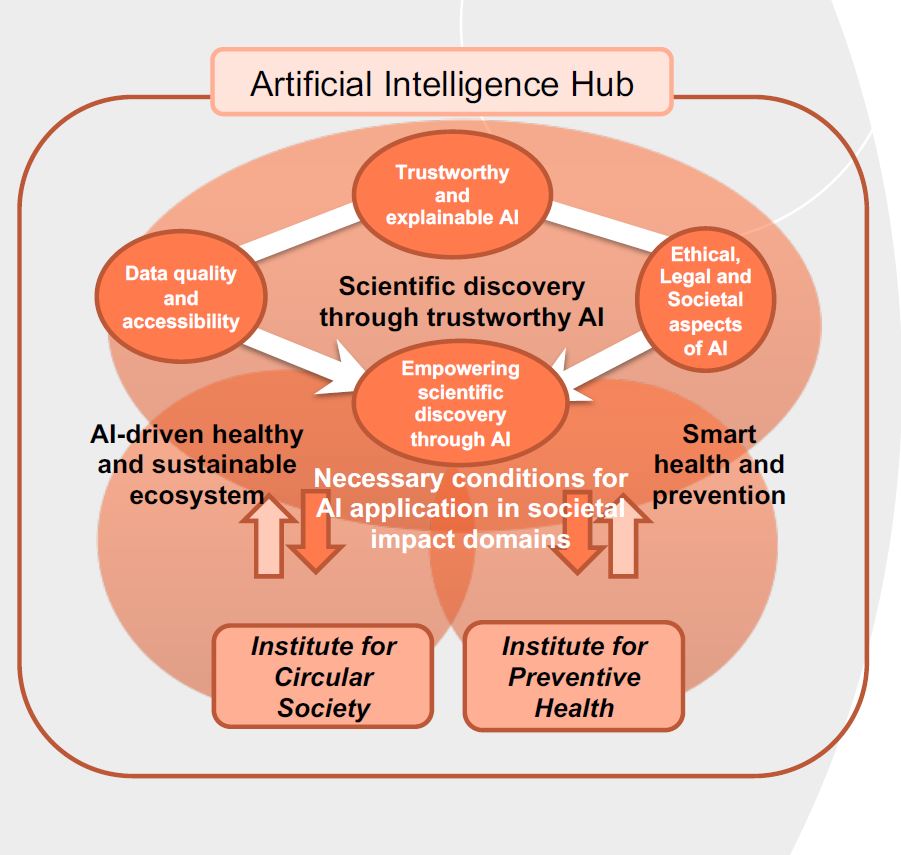The alliance TU/e-WUR-UU-UMCU (EWUU) is an internationally unique consortium and setting where four complementary leading institutes on technology, health, environment and sustainability collaborate, bringing together all required disciplines to address complex challenges of present and future time. This comprehensive range of expertise and knowledge forms the foundation of the EWUU alliance AI-Hub, which focuses on overcoming the barriers that hinder practical implementation of AI, delivering meaningful benefits to society. The EWUU AI-Hub addresses research and education on AI, with AI and about AI.
All four EWUU partners have unique track records, resources and contributions in terms of expertise in AI:
- At the Eindhoven Univerisity of Technology the AI expertise is centralized in the Eindhoven Artificial Intelligence Systems Institute. EAISI focuses on AI systems that integrate the physical, digital, and human worlds. Its mission is to advance understanding, design, modeling, and decision-making in key application areas: Health, Mobility, and Industry. EAISI’s research is supported by state-of-the-art computing and research data infrastructure as well as by digital twin and automated driving infrastructure.
- At Wageningen University & Research, the development and application of AI across all research domains is a strategic priority. This includes areas such as the environment, society, plants, animals, food safety, and health. The WUR leverages AI both in fundamental research and in practical applications, aiming to demonstrate its societal value at higher TRL levels. To support this goal, several strategic investment programs have been launched, including Digital Twins, a new BSc and MSc in data Sciences for life sciences and the institution of a new chairgoup in AI.
- AI research at Utrecht University is distinguished by its integration of traditional symbolic or model-driven approaches with modern data-driven methods. Key strengths are the research in AI itself, the research with AI in application domains, and the research on the governance of AI, which come together in the AI Labs.
- At UMC Utrecht AI is integral in its research, education and daily care. AI is embedded in the entire health continuum the UMCU addresses, from prevention to screening (early detection), diagnosis, prognosis, treatment, monitoring and home care. Some key AI topics include AI enhanced medical imaging, AI enhanced living technologies and regenerative medicine, AI enhanced molecular medicine, AI for healthy living and the ethics, foundations and methods for trustworthy and explainable AI. Besides the UMC Utrecht hosts important large patient and citizen cohorts as well as real world patient data sources, such as the Utrecht Cardiovascular Cohort, Julius Primary Care data, Utrecht Patient Oriented Database and electronic health records.
The EWUU AI-Hub addresses all key challenges in AI, including ensuring trustworthy and transparency through valid and explainable AI, co-creating and validating and implementing AI systems to meet trustworthy, cost-effective, ethical, legal, and societal requirements, and balancing automation with human insight in applications like personalized medicine, remote patient monitoring, and AI-driven nutrition research. Furthermore, the AI developed, tested and implemented by and in our institutes drives scientific breakthroughs.
By leveraging the comprehensive and complementary AI strengths of the EWUU AI-hub, we accelerate demand-driven research in collaboration with numerous specialised and dedicated AI labs and public-private partners, ensuring solutions are both innovative and aligned with real-world needs and requirements. Our approach fosters impactful applications of AI in health promotion and circularity, advancing practical, sustainable solutions to society’s most pressing challenges.
